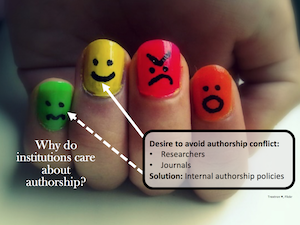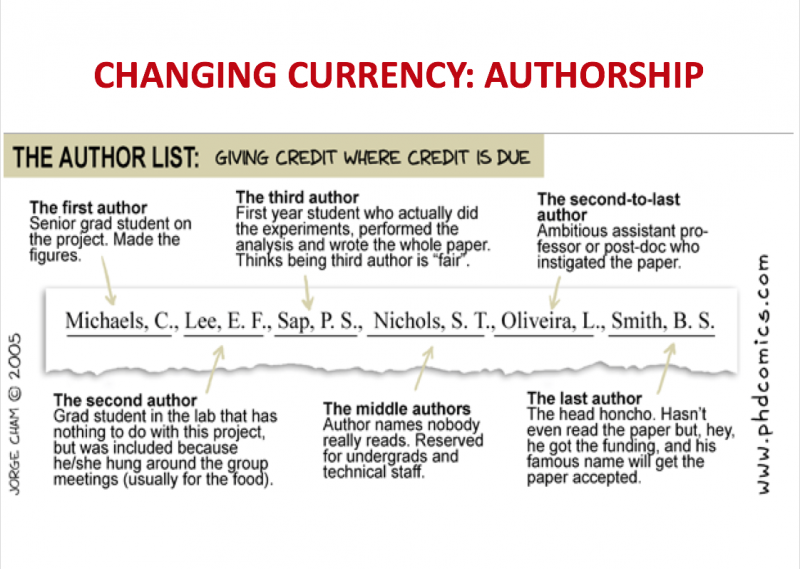Standards in authorship
COPE Webinar 29 June, 2017
Watch and listen again to the recording of our Standards in Authorship webinar.
COPE made history on 29th June 2017 with the first COPE educational webinar on the topic of Standards in authorship, which focused on issues that arise with authorship in academic publishing. Attendees dialled in from across the world and had a wide range of backgrounds spanning health and life sciences; environmental and earth sciences; mathematics, computing and engineering; physical sciences; and humanities and social sciences.
Trevor Lane (COPE Council Member and Education Director and Senior Publishing Consultant, Edanz Group) introduced and moderated the webinar, reflecting on the importance of authorship in shaping academic careers and the factors that impinge on authorship across cultures and disciplines.
Deborah Poff (COPE Vice-Chair and Chair-Elect, and Editor-in-Chief, Journal of Academic Ethics) clarified a distinction between the humanities and the social sciences on the topic of authorship. In the humanities, it is considered unethical if a supervisor is listed as an author on a student’s paper, a view at odds with that held in the sciences. As a result, the publication ethics issues in the humanities are not really about authorship per se; rather, they involve other issues: self-citation, plagiarism and redundant publication.
In contrast, traditions in the social sciences resemble those seen in the sciences more generally, where the student is usually the first author and the supervisor is included in the author list. Most authorship disputes tend to arise from not clearly stipulating authorship roles prior to engaging in the research or because of disagreements between members of the group. Transparent agreements upfront can help to identify any unique issues and resolve authorship disputes. However, it was interesting to see from the webinar polls, that only 48% of attendees discuss authorship before a project begins, with 26% never discussing authorship and 26% always raising it.
only 48% of attendees discuss authorship before a project begins,
with 26% never discussing authorship and 26% always raising it
 Kelly Cobey (Senior Clinical Research Associate, Ottawa Hospital Research Institute, Ottawa, Canada) explained why institutions care about authorship: authorship confers credit and highlights academic productivity. However, to avoid potential authorship disputes, institutions need internal authorship policies and training. The challenge for institutions is how best to provide that guidance and disseminate it. Can more be done to support Research Integrity Officers proactively, perhaps with assistance from designated Publications Officers?
Kelly Cobey (Senior Clinical Research Associate, Ottawa Hospital Research Institute, Ottawa, Canada) explained why institutions care about authorship: authorship confers credit and highlights academic productivity. However, to avoid potential authorship disputes, institutions need internal authorship policies and training. The challenge for institutions is how best to provide that guidance and disseminate it. Can more be done to support Research Integrity Officers proactively, perhaps with assistance from designated Publications Officers?
Image: Trextron Flickr
 Liz Allen (Director of Strategic Initiatives, F1000 and Co-Chair of Project CRediT [Contributor Roles Taxonomy]) highlighted the fact that the use of authorship position on a paper to imply the role played in the research is now recognised as outdated (and frankly bizarre). Many journals are facilitating transparency by requiring authors to specify authorship contributions in the article. CRediT is a CASRAI (Consortia Advancing Standards in Research Administration Information) initiative that consolidates this drive further with a 14-term taxonomy of ‘contributorship roles’ for those involved in research. Image: Jorge Cham
Liz Allen (Director of Strategic Initiatives, F1000 and Co-Chair of Project CRediT [Contributor Roles Taxonomy]) highlighted the fact that the use of authorship position on a paper to imply the role played in the research is now recognised as outdated (and frankly bizarre). Many journals are facilitating transparency by requiring authors to specify authorship contributions in the article. CRediT is a CASRAI (Consortia Advancing Standards in Research Administration Information) initiative that consolidates this drive further with a 14-term taxonomy of ‘contributorship roles’ for those involved in research. Image: Jorge Cham
Critically, the information on roles is embedded in the article’s metadata and can be linked to an author’s individual ORCID. Of the webinar attendees, 58% were already familiar with CRediT, 44% had not used CRediT but would try it in future, 12% had already used CRediT and 2% had not used CRediT and would not use in future. The CRediT project encourages feedback here.
Authorship issues remain one of the most common concerns for COPE members and COPE has created dedicated resources to help: a guide for new researchers, COPE discussion document on authorship, e-learning module (members only) and specific flowcharts to support editors handling authorship issues.
In reflecting on the perspectives of the speakers and the questions from the audience, there’s a clear need to involve all stakeholders—funders, institutions, researchers and publishers—in discussions. While we probably cannot standardise authorship across every discipline and culture, initiatives like ORCID and CRediT are a step forward in ensuring transparency and accountability. We will be revising the COPE discussion on authorship based on the webinar and discussion. If you have any suggestions for further revisions, we would welcome your feedback by email by Friday 21 July, 2017.
Speaker presentations are now available on the COPE website.
Watch and listen again to the recording of the webinar.
Related resources
Authorship discussion document
How to handle authorship disputes: a guide for new researchers
ICMJE: Defining the role of authors and contributors
Beyond authorship: attribution, contribution, collaboration and credit
Transparency in Authors' Contributions and Responsibilities to Promote Integrity in Scientific Publication